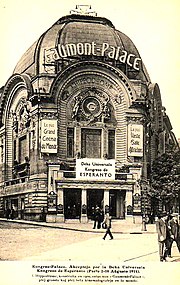Cinema of France
| Cinema of France | |
|---|---|

Gaumont palace in Paris, c.1914
|
|
| Number of screens | 5,653 (2014) |
| Main distributors |
Twentieth Century Fox (14.6%) Warner Bros. (9.8%) UGC (6.9%) |
| Produced feature films (2014) | |
| Total | 258 |
| Animated | 9 (3.49%) |
| Documentary | 37 (14.34%) |
| Number of admissions (2014) | |
| Total | 208.9768 million |
| National films | 91.26 million (44.4%) |
| Gross box office (2014) | |
| Total | €1.33 billion |
| National films | €563.01 million (43.1%) |
Cinema of France refers to the film industry based in France. The French cinema comprises the art of film and creative movies made within the nation of France or by French filmmakers abroad.
France is the birthplace of cinema and was responsible for many of its significant contributions to the art form and the film-making process itself. Several important cinematic movements, including the Nouvelle Vague, began in the country. It is noted for having a particularly strong film industry, due in part to protections afforded by the French government.
Apart from its strong and innovative film tradition, France has also been a gathering spot for artists from across Europe and the world. For this reason, French cinema is sometimes intertwined with the cinema of foreign nations. Directors from nations such as Poland (Roman Polanski, Krzysztof Kieślowski, and Andrzej Żuławski), Argentina (Gaspar Noé and Edgardo Cozarinsky), Russia (Alexandre Alexeieff, Anatole Litvak), Austria (Michael Haneke), and Georgia (Géla Babluani, Otar Iosseliani) are prominent in the ranks of French cinema. Conversely, French directors have had prolific and influential careers in other countries, such as Luc Besson, Jacques Tourneur, or Francis Veber in the United States.
...
Wikipedia
